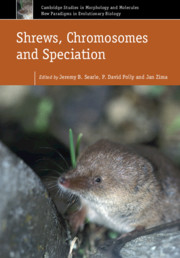Crossref Citations
This Book has been
cited by the following publications. This list is generated based on data provided by Crossref.
Romanenko, Svetlana A.
Lyapunova, Elena A.
Saidov, Abdusattor S.
O’Brien, Patricia C.M.
Serdyukova, Natalia A.
Ferguson-Smith, Malcolm A.
Graphodatsky, Alexander S.
and
Bakloushinskaya, Irina
2019.
Chromosome Translocations as a Driver of Diversification in Mole Voles Ellobius (Rodentia, Mammalia).
International Journal of Molecular Sciences,
Vol. 20,
Issue. 18,
p.
4466.
Grzywacz, Beata
Tatsuta, Haruki
Bugrov, Alexander G.
and
Warchałowska-Śliwa, Elżbieta
2019.
Cytogenetic markers reveal a reinforcement of variation in the tension zone between chromosome races in the brachypterous grasshopper Podisma sapporensis Shir. on Hokkaido Island.
Scientific Reports,
Vol. 9,
Issue. 1,
Majtánová, Zuzana
Indermaur, Adrian
Bitja Nyom, Arnold Roger
Ráb, Petr
and
Musilova, Zuzana
2019.
Adaptive Radiation from a Chromosomal Perspective: Evidence of Chromosome Set Stability in Cichlid Fishes (Cichlidae: Teleostei) from the Barombi Mbo Lake, Cameroon.
International Journal of Molecular Sciences,
Vol. 20,
Issue. 20,
p.
4994.
Matveevsky, Sergey
Kolomiets, Oxana
Bogdanov, Aleksey
Alpeeva, Elena
and
Bakloushinskaya, Irina
2020.
Meiotic Chromosome Contacts as a Plausible Prelude for Robertsonian Translocations.
Genes,
Vol. 11,
Issue. 4,
p.
386.
Shchipanov, N. A.
Artamonov, A. V.
Titov, S. V.
and
Pavlova, S. V.
2020.
Spatial Population Genetic Structuring of the Common Shrew Sorex araneus (Lipotyphla, Mammalia): Variability of Microsatellite Markers.
Russian Journal of Genetics,
Vol. 56,
Issue. 8,
p.
942.
Raspopova, Alexandra A.
Bannikova, Anna A.
Sheftel, Boris I.
Kryštufek, Boris
Kouptsov, Alexander V.
Illarionova, Natalia A.
Pavlova, Svetlana V.
and
Lebedev, Vladimir S.
2020.
A never-ending story of the common shrew: searching for the origin..
Mammal Research,
Vol. 65,
Issue. 4,
p.
729.
Bulatova, Nina
2020.
Notable homologous variation in chromosomal races of the common shrew.
Comparative Cytogenetics,
Vol. 14,
Issue. 3,
p.
313.
Shchipanov, Nikolay A.
Artamonov, Artem V.
and
Demidova, Tatiana B.
2021.
Body weight as an indicator of the reproduction rate in population of the common shrew.
Mammal Research,
Vol. 66,
Issue. 2,
p.
327.
Grigorkina, E. B.
and
Olenev, G. V.
2021.
Nonresident Activity of Shrews (Sorex araneus, Eulipotyphla): Group Marking.
Russian Journal of Ecology,
Vol. 52,
Issue. 4,
p.
344.
Kuznetsova, Valentina G.
Gavrilov-Zimin, Ilya A.
Grozeva, Snejana M.
and
Golub, Natalia V.
2021.
Comparative analysis of chromosome numbers and sex chromosome systems in Paraneoptera (Insecta).
Comparative Cytogenetics,
Vol. 15,
Issue. 3,
p.
279.
Shchipanov, Nikolay A.
Demidova, Tatiana B.
Artamonov, Artem V.
and
Pavlova, Svetlana V.
2022.
Seasonal and interannual survivorship in the common shrew: the early bird catches the worm.
Mammalian Biology,
Vol. 102,
Issue. 1,
p.
73.
Bugarski-Stanojević, Vanja
Stamenković, Gorana
Jojić, Vida
Ćosić, Nada
Ćirović, Duško
Stojković, Oliver
Veličković, Jelena
and
Savić, Ivo
2022.
Cryptic Diversity of the European Blind Mole Rat Nannospalax leucodon Species Complex: Implications for Conservation.
Animals,
Vol. 12,
Issue. 9,
p.
1097.
Grigorkina, E. B.
Olenev, G. V.
and
Tolkachev, O. V.
2022.
Method for Detection of Exact Place of Birth of Small Mammals in the Studies Using Group Labeling with Rhodamine.
Russian Journal of Ecology,
Vol. 53,
Issue. 2,
p.
136.
Kunerth, Henry D.
Tapisso, Joaquim T.
Valente, Raul
Mathias, Maria da Luz
Alves, Paulo C.
Searle, Jeremy B.
Vega, Rodrigo
and
Paupério, Joana
2022.
Characterising Mitochondrial Capture in an Iberian Shrew.
Genes,
Vol. 13,
Issue. 12,
p.
2228.
Potter, Sally
Bragg, Jason G
Turakulov, Rustamzhon
Eldridge, Mark D B
Deakin, Janine
Kirkpatrick, Mark
Edwards, Richard J
Moritz, Craig
and
Yoder, Anne
2022.
Limited Introgression between Rock-Wallabies with Extensive Chromosomal Rearrangements.
Molecular Biology and Evolution,
Vol. 39,
Issue. 1,
Zhou, Weiwei
Furey, Neil M.
Soisook, Pipat
Thong, Vu D.
Lim, Burton K.
Rossiter, Stephen J.
and
Mao, Xiuguang
2023.
Diversification and introgression in four chromosomal taxa of the Pearson’s horseshoe bat (Rhinolophus pearsoni) group.
Molecular Phylogenetics and Evolution,
Vol. 183,
Issue. ,
p.
107784.
Bikchurina, Tatiana
Pavlenko, Marina
Kizilova, Elena
Rubtsova, Daria
Sheremetyeva, Irina
Kartavtseva, Irina
Torgasheva, Anna
and
Borodin, Pavel
2023.
Chromosome Asynapsis Is the Main Cause of Male Sterility in the Interspecies Hybrids of East Asian Voles (Alexandromys, Rodentia, Arvicolinae).
Genes,
Vol. 14,
Issue. 5,
p.
1022.
Svoboda Karić, Petra
Anđelić Dmitrović, Barbara
Mrmić, Stella
Paić, Antonia
Bjedov, Linda
Štritof, Zrinka
Margaletić, Josip
and
Kurolt, Ivan-Christian
2023.
First Molecular Evidence of Seewis Virus in Croatia.
Life,
Vol. 13,
Issue. 12,
p.
2359.
Kolomiets, Oxana
Bakloushinskaya, Irina
Pankin, Mark
Tambovtseva, Valentina
and
Matveevsky, Sergey
2023.
Irregularities in Meiotic Prophase I as Prerequisites for Reproductive Isolation in Experimental Hybrids Carrying Robertsonian Translocations.
Diversity,
Vol. 15,
Issue. 3,
p.
364.
Bulatova, N. Sh.
2024.
Cytogenetics and Evolutionary Synthesis: A Tribute on an Anniversary of Academician I.I. Schmalhausen (1884–1963).
Paleontological Journal,
Vol. 58,
Issue. 12,
p.
1443.

 Loading metrics...
Loading metrics...


